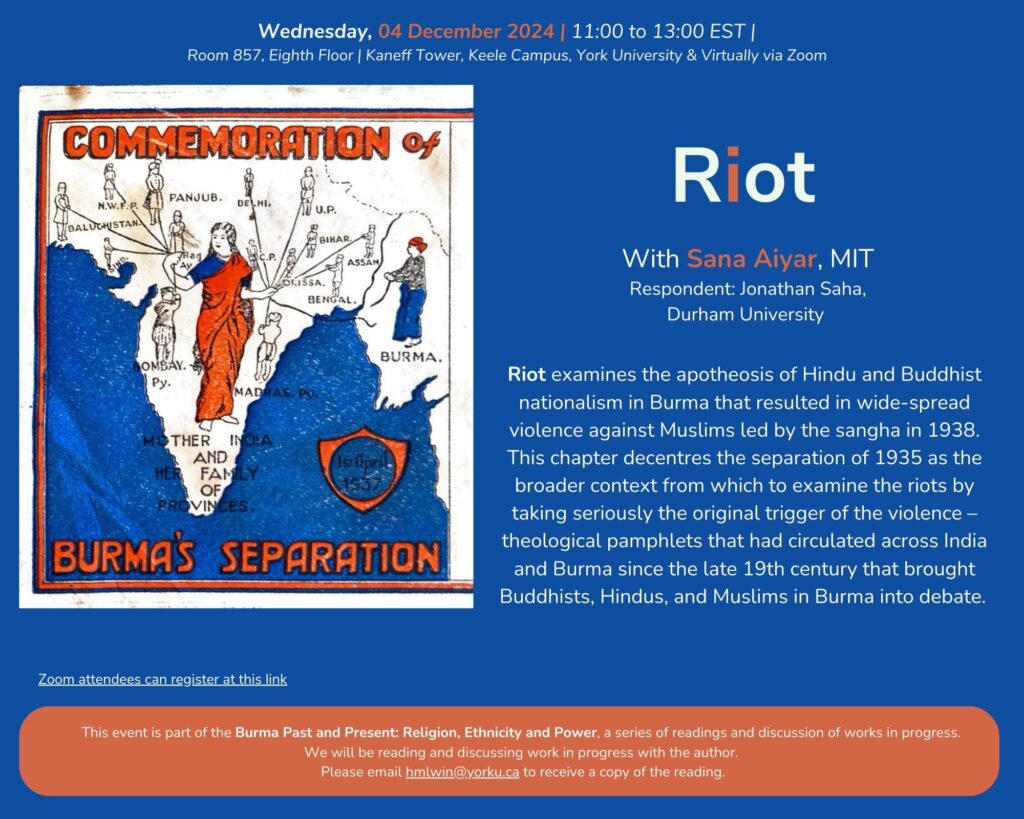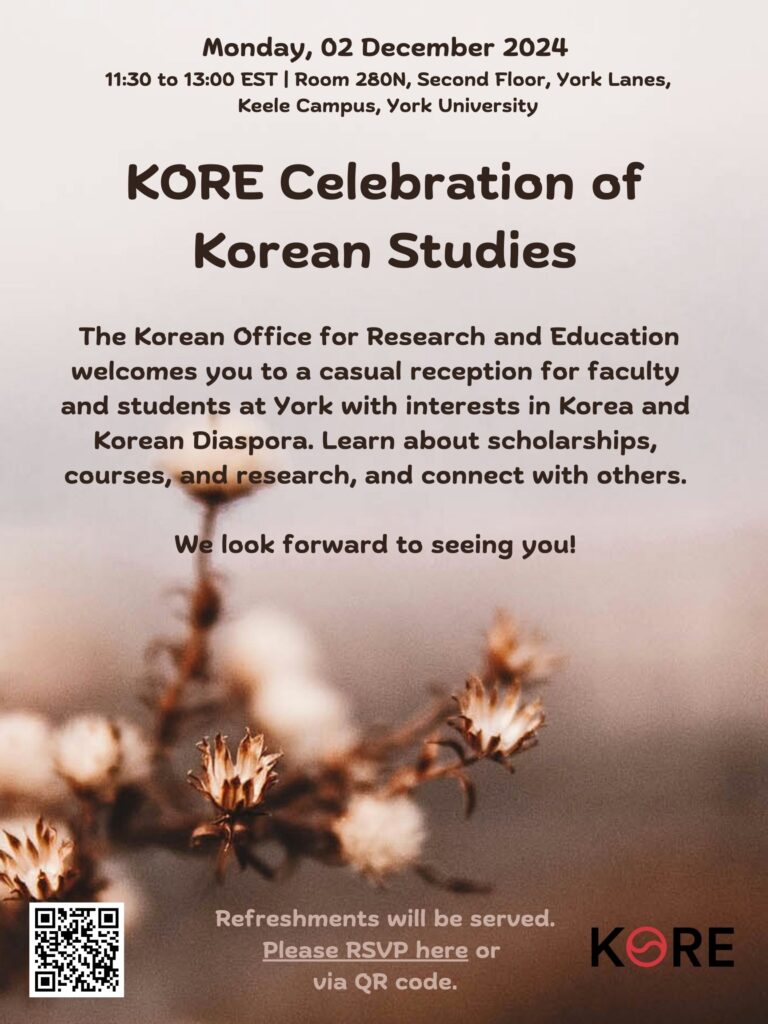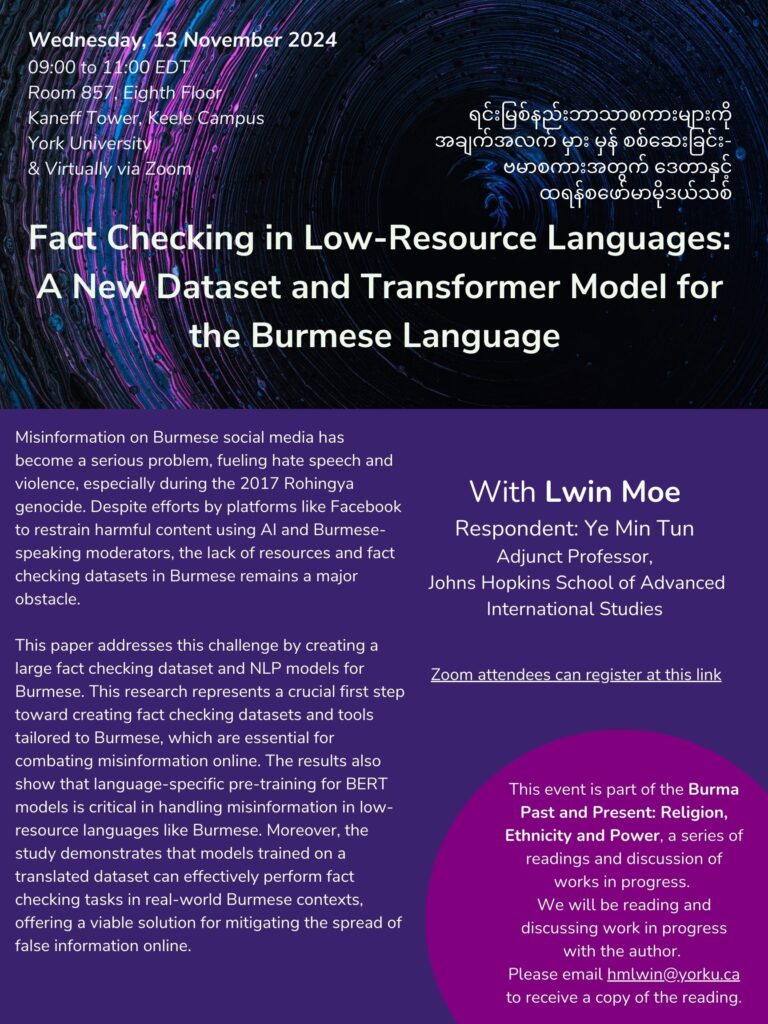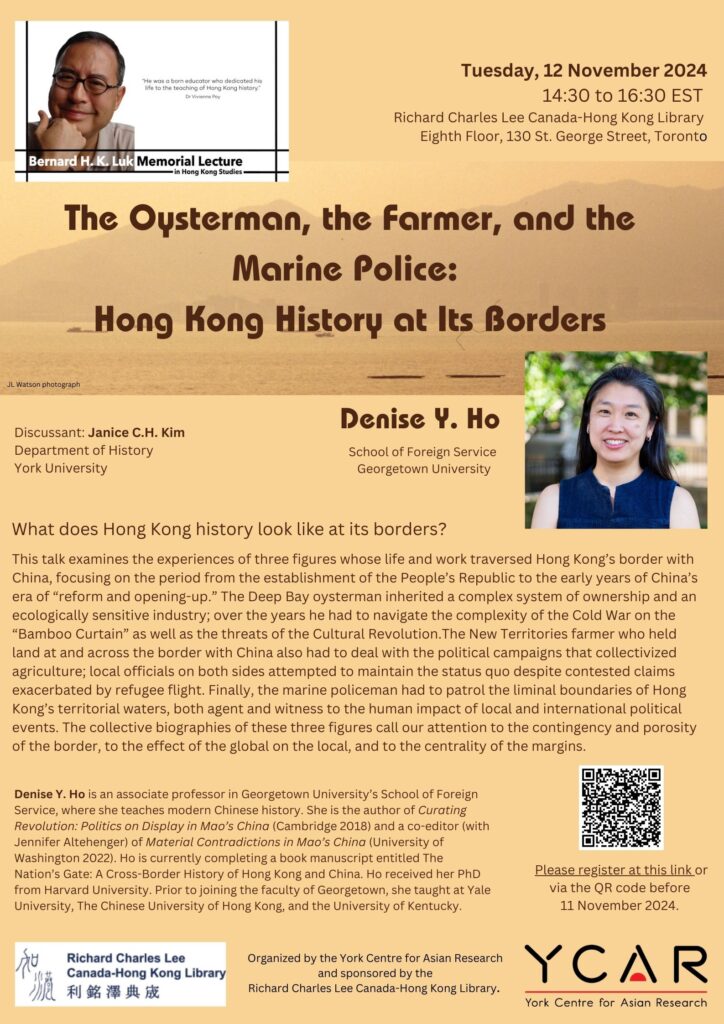January 2025
The Phaung Daw Oo Buddhas: Transformation Through Touch Worship
Organizer
-
Burma Studies Initiatives

Location
- Room 857, Eighth Floor, Kaneff Tower, Keele Campus, York University and virtually via Zoom

The Phaung Daw Oo Buddhas: Transformation Through Touch Worship
Wednesday, 15 January 2024 | 09:00 to 11:00 EDT | Room 857, Eighth Floor, Kaneff Tower, Kaneff Tower, Keele Campus, York University & virtually via Zoom
With Gillian Graham
Respondent: Juliane Schober
Central to the political, historical, mythic and religious identity of Inle Lake in Shan State are five Buddha statues called the Phaung Daw U paya whose unique globular forms are the result of decades of devotional gilding. Within the frames of Buddhist art history and practice, the essay considers their relationship to aniconism and to beliefs surrounding the interment of relics. As well, it charts their role as palladia or protectors of the lake community through a century of conquest and rupture.
Virtual attendees can register at this link.
This event is part of the Burma Past and Present: Religion, Ethnicity and Power, a series of readings and discussion of works in progress. We will be reading and discussing work in progress with the author. Please email hmlwin@yorku.ca to receive a copy of the reading.
‘Moscow is not a geographical but a political notion’: M.N. Roy and the Communist International, 1920–1930

Location
- Room 305, Third Floor, York Lanes, Keele Campus, York University

Wednesday, 15 January 2025 | 14:00 to 16:00 EST | Room 305, Third Floor, York Lanes, Keele Campus, York University
With Christopher Balcom, Doctoral Candidate, Social and Political Thought, York University
Discussant: Asad Haider (Department of Politics, York University)
The revolutionary intellectual M.N. Roy left India as a young nationalist militant in 1915 and would not return to the country until 1930. In the intervening years Roy founded two communist parties—the Mexican Communist Party and the Communist Party of India—and served as a leading figure in the Communist International from 1920-1928. Recent scholarly interest in Roy has tended to privilege Roy’s undeniably fascinating biography at the expense of an adequate engagement with his political thought. In this paper, I focus on Roy’s years in the Communist International, considering his famous 1920 debate with Lenin, his penetrating critique of the Indian national movement, and his efforts to advance a loyalist critique of the Comintern project in the years immediately following his expulsion from the organization in 1928. One finds in Roy’s work from this period a powerful testament to the promise of communist internationalism and unique insights into the tensions between communism and anticolonial nationalism. I also argue that Roy’s writings advance a rather different critique of colonialism than that which prevails today, one premised on a fundamental commensurability between Indian and European social realities and political struggles.
Christopher Balcom is a doctoral candidate in Social and Political Thought at York University. His research focusses on Marxist and anticolonial political theory and intellectual history. His writing has been published in South Asia: Journal of South Asian Studies and Contemporary Political Theory.
This event is part of the Demos, Democracy and Democratization: South Asia Lecture Series 2024–25.
February 2025
Climate Change in Palestine: Hazards, Vulnerabilities, and the Intersection with Conflict

Location
- Room 280N, Second Floor, York Lanes, York University
- Room 280N, Second Floor, York Lanes, York University

Monday, 24 February 2025 | 12:30 to 14:30 EST | Room 280N, Second Floor, York Lanes, Keele Campus, York University
With Ahmed Abu Shaban, Visiting Scholar at the Faculty of Environmental and Urban Change, York University; Al Azhar University, Gaza
Palestine is among the most climate-vulnerable regions in the world, facing a wide range of climate hazards that severely impact its population. Rising temperatures, water scarcity, and increasing drought frequency threaten both livelihoods and food security. Over time, Palestine has experienced significant temperature increases, and projections suggest a continued alarming rise in the coming decades. The region also faces severe water scarcity, with water availability well below the levels needed to avoid stress. This situation is further worsened by reduced rainfall and increasing droughts, which are expected to become more frequent and intense, putting further strain on agriculture and livelihoods. These challenges are compounded by political and economic instability. The ongoing Israeli occupation, conflict, and destruction of infrastructure have weakened Palestine’s adaptive capacity, hindering the implementation of climate resilience strategies. For instance, recent studies have shown that the war in Gaza has caused significant CO2 emissions due to the destruction of buildings, further accelerating climate degradation. Despite similarities to other Asian countries facing climate risks, Palestine’s situation is more dire due to its limited governance over natural resources, severe water scarcity, and conflict-induced vulnerabilities. The presentation will explore the intersection of climate change, political conflict, and socioeconomic impacts in Palestine, highlighting the need for localized, conflict-sensitive adaptation strategies.
Ahmed Abu Shaban is a Visiting Professor from Palestine and previously served as Dean of the Faculty of Agriculture at Al Azhar University, Gaza. He teaches climate justice and policy at York University. Dr. Abu Shaban has worked with UN agencies and international non-governmental organizations on climate change adaptation and economic empowerment programs in conflict-affected areas. His roles include serving as a Climate Change Consultant for the World Food Programme (WFP).
This event is part of the Climate Dystopias in Asia series, which is co-presented with the Faculty of Environmental and Urban Change.
March 2025
Muslim Model Minorities and the Politics of Diasporic Piety

Location
- Room 519, Fifth Floor, Kaneff Tower, Keele Campus, York University

Wednesday, 12 March 2025 | 14:00 to 16:00 EST | Room 519, Fifth Floor, Kaneff Tower, Keele Campus, York University
With Nadia Z. Hasan, School of Gender, Sexuality and Women’s Studies, York University
In contemporary Islamophobic political climates in Canada, the interplay of gender and multicultural logics of citizenship and belonging have placed Muslim women in precarious positions as foils for democratic and neoliberal values. Grounded in an analysis of the lived experiences of Pakistani Muslim women in Canada, this presentation explores relationships between Islamic religiosity, discourses of multicultural citizenship, and the trope of the model minority, which sets in motion a powerful discourse that maps out terms of inclusion and a seductive promise of belonging. This presentation focuses on women who are committed to developing their piety through participation in Al-Huda International, a women’s Islamic education organization that had gained notoriety within the Pakistani community and in the mainstream as a particularly conservative form of Islam. This notoriety would in some ways suggest that these women are precluded from the category of the model minority because of the practices that emerge out of their engagements with Al-Huda’s teachings (such as defined domestic roles for women, patriarchal household structures, hijab and niqab). Drawing on interviews and participatory observations with a women’s Quran class in Mississauga, Canada, this presentation traces how, despite this notoriety and related preclusion, these women engage, transform, and reproduce the trope of the model minority through the way they develop their piety in diaspora. I argue that diasporic piety is articulated, practiced, and developed in relation to heteropatriarchal trajectories of migration and a diasporic sense of loss of nation, which is recuperated through multicultural categories of identity, enmeshed in the racialized politics of model minorities.
Nadia Z. Hasan is assistant professor in the School of Gender, Sexuality and Women’s Studies. Her research and community work focus on systemic racism and Islamophobia in legal, administrative, and discursive regimes and their relation to Muslim life. Professor Hasan is co-author of the WAGE-funded community-based study by the National Council of Canadian Muslims (NCCM), Social Discord and Second-class Citizenship: A Study of the Impact of Bill 21 on Quebec Muslim Women in Light of the COVID-19 Pandemic.
This event is part of the Demos, Democracy and Democratization: South Asia Lecture Series 2024–25.
Grid View
Events for 1st December
Events for 2nd December
KORE Celebration of Korean Studies
Events for 3rd December
Events for 4th December
Riot
Events for 5th December
Events for 6th December
Events for 7th December
Events for 8th December
Events for 9th December
Events for 10th December
Events for 11th December
Events for 12th December
Events for 13th December
Events for 14th December
Events for 15th December
Events for 16th December
Events for 17th December
Events for 18th December
Events for 19th December
Events for 20th December
Events for 21st December
Events for 22nd December
Events for 23rd December
Events for 24th December
Events for 25th December
Events for 26th December
Events for 27th December
Events for 28th December
Events for 29th December
Events for 30th December
Events for 31st December
December 2024
Riot
Organizer
-
Burma Studies Initiatives

Location
- Room 857, Eighth Floor, Kaneff Tower, Keele Campus, York University and virtually via Zoom

Wednesday, 04 December 2024 | 11:00 to 13:00 EST | Room 857, Eighth Floor, Kaneff Tower, Keele Campus, York University and virtually via Zoom
With Sana Aiyar, MIT
Respondent: Jonathan Saha, Durham University
Riot examines the apotheosis of Hindu and Buddhist nationalism in Burma that resulted in wide-spread violence against Muslims led by the sangha in 1938. This chapter decenters the separation of 1935 as the broader context from which to examine the riots by taking seriously the original trigger of the violence – theological pamphlets that had circulated across India and Burma since the late 19th century that brought Buddhists, Hindus, and Muslims in Burma into debate. These publications raised existential questions about the truthfulness of god, challenging Buddhist monks, Muslim Maulvis and Hindu Swamis to prove the superiority of their religion. At the same time, these texts aimed at proselytizing, through dialogue, laymen and women, whose readings and interpretations of the same were mediated by their social and political context. The inter-religious, inter-textual discourses of these tracts invoked the sacred geography and community of India and Burma. The separation of 1935 drew a cartographic line on this map, but it did not fracture the shared religious geography and religious communities that had been constituted by these custodians of faith. This chapter situates the riots of 1938 within this intimate politico-religious map to highlight the wide resonance and long-lasting reverberation of the sangha’s call to action. The circulation and networks of religious debate and majoritarian politics that produced the authors of these texts not only predated but outlasted the separation of 1935. The xenophobic nationalism that violently expressed itself in July 1938, I argue, was in fact the articulation of the shared project of Hindu and Buddhist religious majoritarianism that coalesced in the 1930s around the imagined existential threat posed by Muslims in India and Burma. This was the first successful mass mobilization of religious majoritarianism in South Asia which anticipated the partition of 1947 by a decade and emerged from the same exclusionary Hindu and Buddhist nationalist politics that marginalized Muslims in both India and Burma.
This event is part of the Burma Past and Present: Religion, Ethnicity and Power, a series of readings and discussion of works in progress. We will be reading and discussing work in progress with the author. Please email hmlwin@yorku.ca to receive a copy of the reading.
This event is hybrid. Virtual attendees should register at this link.
End of Term Social

Location
- Room 280N, Second Floor, York Lanes, York University
- Room 280N, Second Floor, York Lanes, York University

Tuesday, 03 December 2024 | 2:00 p.m. to 4:00 p.m. | Room 280N, Second Floor, York Lanes, Keele Campus, York University
The York Centre for Asian Research warmly invites all York students, faculty and visitors interested in Asia/Diasporas to an End of Term Social.
Drop by for refreshments and snacks and meet with colleagues and friends in our research community.
KORE Celebration of Korean Studies
Organizer
-
Korean Office for Research and Education (KORE)

Location
- Room 280N, Second Floor, York Lanes, York University
- Room 280N, Second Floor, York Lanes, York University

Monday, 02 December 2024 | 11:30 to 13:00 EST | Room 280N, Second Floor, York Lanes, Keele Campus, York University
The Korean Office for Research and Education at the York Centre for Asian Research welcomes you to a casual reception for faculty and students at York with interests in Korea and Korean diaspora. Learn about scholarships, courses and research, and connect with others.
We look forward to seeing you!
November 2024
The Launch of Three Mini Documentaries, “Love in the Time of COVID-19” and Immersive Screening of “The Emigrant Queer Lovebirds”


Wednesday, 20 November 2024 | 11:30 to 13:00 EST | 2nd Screening @ 3:00 p.m. | Sensorium Flex Space, Room 326, Joan and Martin Goldfarb Centre for Fine Arts, 86 Fine Arts Road, York University
Each year, numerous queer individuals from Asia immigrate to Canada where they seek socio-economic opportunities, freedom and authenticity in their lifestyles. However, their life experiences are often overshadowed by heteronormative narratives about Asian immigrants in Canadian media. This event comprises in-person presentations, an immersive film screening, and a Q&A session, aiming to generate conversations about Asian queer communities in Canada and promote transnational Asian Studies.
Presenters:
Tracy Ying Zhang: Assistant Professor, Department of Communication and Media Studies, York University
Ali Ghaedi Talkhouncheh: Media Artist, MFA in Film Production, Mel Hoppenheim School of Cinema, Concordia University
Ayse Irem Karabag: PhD Candidate, Department of English, York University.
Lunch will be served. Please RSVP by 18 November 2024 at this link.
Presented by the York Centre for Asian Research, Sensorium, the Faculty of Liberal Arts & Professional Studies, the Department of Communication and Media Studies, and the Department of English.
For more information: ycar@yorku.ca
Koral Dasgupta on Indian mythology and philosophy reframed: The intricacies of re-telling stories through social justice and gender perspectives


Thursday, 14 November 2024 | 11:30 to 13:30 EST | Virtually via Zoom
Koral Dasgupta, storyteller and founder of www.tellmeyourstory.biz, will be talking about the making of the Sati Series, a collection of works of mythological fiction (TheSatiSeries - KoralDasgupta) and lead the audience into a workshop on story telling and story receiving.
Stories of ancient culture were traditionally exploited to produce regressive narratives, endorsing macho men who control women. But when one consciously reads the poetry of ancient India, he/she can discover spiritual secrets that vastly differ from the popular belief or creative translations.
Myth tells us that no one can be perfectly fair - not even God. The Indian epics introduce gorgeous men who are not afraid of women's talent and own their mistakes. They collide or collaborate with women in various ways, producing multi-layered results. Indian mythology philosophises about the harmony of masculine and feminine energies to restore peace and enhance productivity. Shiva-Shakti, for example, is a team. When Shiva is separated from Shakti, it results in Taandav. Shakti chanelizes Shiva, contrary to the popular conditioning that men should control women. Here again, lies the fundamentals of social injustice.
Attendees can register at this link.
This event is presented with support from the York Centre for Asian Research.
Fact Checking in Low-Resource Languages: A New Dataset and Transformer Model for the Burmese Language

Location
- Room 857, Eighth Floor, Kaneff Tower, Keele Campus, York University and virtually via Zoom

Wednesday, 13 November 2024 | 09:00 to 11:00 EDT | Room 857, Eighth Floor, Kaneff Tower, Keele Campus, York University and virtually via Zoom
With Lwin Moe, York University
Respondent: Ye Min Tun, Adjunct Professor, Johns Hopkins School of Advanced International Studies
Misinformation on Burmese social media has become a serious problem, fueling hate speech and violence, especially during the 2017 Rohingya genocide. Despite efforts by platforms like Facebook to restrain harmful content using AI and Burmese-speaking moderators, the lack of resources and fact checking datasets in Burmese remains a major obstacle. This paper addresses this challenge by creating a large fact checking dataset and NLP models for Burmese. Using a machine-translated version of the Fake News Challenge (FNC-1) dataset, named FNC-1B, three BERT-based classifiers were trained and evaluated. The best-performing model achieved 81\% accuracy on the translated FNC-1B dataset, and 79\% on a manually annotated Burmese dataset. This performance is comparable to that of the BERT model for fact checking in English, which yielded 82\% accuracy on the English version of the dataset. This research represents a crucial first step toward creating fact checking datasets and tools tailored to Burmese, which are essential for combating misinformation online. The results also show that language-specific pre-training for BERT models is critical in handling misinformation in low-resource languages like Burmese. Moreover, the study demonstrates that models trained on a translated dataset can effectively perform fact checking tasks in real-world Burmese contexts, offering a viable solution for mitigating the spread of false information online.
This event is part of the Burma Past and Present: Religion, Ethnicity and Power, a series of readings and discussion of works in progress. We will be reading and discussing work in progress with the author. Please email hmlwin@yorku.ca to receive a copy of the reading.
This event is hybrid. Virtual attendees should register at this link.
Hydropower(ed) Nation: Ruin and Renewability in Kashmir
Organizer
-
South Asia Studies Group

Location
- Room 305, Third Floor, York Lanes, Keele Campus, York University
Wednesday, 13 November 2024 | 14:00 to 16:30 EST | Room 305, Third Floor, York Lanes, Keele Campus, York University

With Mona Bhan, Syracuse University
In March 2019, the Indian government declared large hydropower to be a renewable source of energy. The move was designed to boost the industry's potential while recognizing hydropower's role in stabilizing an otherwise unstable national power grid. Only months after this decision, the Indian government revoked Kashmir’s autonomous constitutional status, making the militarily occupied region even more vulnerable to massive hydropower investments and to India's settler extractive logics. My presentation analyzes the political and material logics that co-produce hydropower as India’s “forever asset” and Kashmir as Hindu India’s eternal and timeless part. As claims of hydropower’s foreverness melded with India’s primordial links to Kashmir, the project of re-engineering nation and nature worked in concert to produce India’s contested sovereignty in Kashmir.
Mona Bhan is Professor of Anthropology and the Ford-Maxwell Professor of South Asian Studies at Syracuse University. She is a political and environmental anthropologist whose work on Indian-occupied Kashmir explores the role of economic and infrastructural development in counterinsurgency operations and people's resistance movements to protracted wars and settler occupation. Her areas of specialization include wars, militarism, and counterinsurgency; indigeneity and settler colonialism; race, gender and religion; ecocide and climate change; and military occupation and infrastructural policies. She is the author of Counterinsurgency, Development, and the Politics of Identity: From Warfare to Welfare? and Climate without Nature: A Critical Anthropology of the Anthropocene (with Andrew Bauer).
With her colleagues from the Critical Kashmir Studies Collective that she helped co-found in 2013, she has co-edited Resisting Occupation in Kashmir, The Routledge Handbook of Critical Kashmir Studies, and the Palgrave Handbook of New Directions in Kashmir Studies. She has also co-edited special issues of the Journal of Legal Pluralism and Unofficial Law (2017) and Critique of Anthropology (2020). Since 2022, as part of her Lender Fellowship for social justice (2022–24), Mona has been working with a team of undergraduate and graduate students to examine how Artificial Intelligence is reconfiguring the city of Syracuse, with a special attention on the ways in which AI has shaped surveillance and policing technologies, discourses of securitization, STEM education in city schools, and claims and counterclaims to citizenship.
This event is part of the following series: Demos, Democracy, Democratization: South Asia Lecture Series 2024–25 and Climate Dystopias in Asia.
Social for graduate researchers of South Asia & the Diaspora
Organizer
-
South Asia Studies Group

Location
- Common Area, Eighth Floor, Kaneff Tower, Keele Campus, York University

Wednesday, 13 November 2024 | 4:30 p.m. to 5:30 p.m. | Eighth Floor Common Area, Kaneff Tower, Keele Campus, York University
The South Asia research cluster at the York Centre for Asian Research invites graduate scholars working on the broad area of South Asia and the diaspora to its first social gathering for the academic year. Graduate students are welcome to stop by and learn more about the cluster and its plans, which includes a graduate student colloquium, creative exhibits and more.
Refreshments will be served. Please register at this link.
The Statue of the Girl for Peace: A Tribute


Tuesday, 12 November 2024 | 14:00 to 17:00 EST | Sensorium Flex Space, Room 326, Joan & Martin Goldfarb Centre for Fine Arts (CFA), Keele Campus, York University
Created by artists Kim Seo-Kyung and Kim Eun-Sung, the Statue of the Girl for Peace commemorates the victims of Japanese military sexual slavery, often euphemistically called "comfort women," during the Asia-Pacific War from the early 1930s to 1945. An estimated 200,000 young girls and women from colonized and occupied regions were subjected to brutal exploitation.
The original statue was installed in front of the Japanese embassy in Seoul in 2011, marking the 1,000th Wednesday Demonstration, a weekly protest by survivors and their supporters, seeking justice and redress for this historical atrocity. Since then, the Statue has become a powerful symbol of the redress movement, fostering alliances across generations and transcending national borders. Replicas have been installed in over 100 locations across Korea and globally, including Australia, Canada, China, Germany, Italy, Japan, Spain, and the United States.
The empty chair beside her symbolizes both the absence of victims who have passed and the ongoing struggle for justice in unresolved war crimes. It extends an invitation for you to join in intergenerational and transnational solidarity against gender-based sexual violence.
This event is presented by mihyun maria kim, Nava Messas Waxman, Marc Nair, and Joshua D. Pilzer. It is organized by Hong Kal & Nava Messas Waxman.
mihyun maria kim is an interdisciplinary artist based in Toronto, researching (un)translatable affects shaped by languages entangled with unresolved historical grief and transmissions of longing. Exhaustion of the body, repetition of movement, fragments of hi/stories, and suspended feelings are explored between memory and imagination across space and time. Through relational methodology, her multivocal outcomes take in/visible form in poetry, painting, performance/activations, audio/video, site-specific installation, community-based round tables and public art.
Nava Messas-Waxman is an interdisciplinary artist and researcher working across performance, film and installation. Her practice engages themes of cultural identity, diaspora, liminality and memory. Currently, she is a PhD candidate in Visual Arts at York University. Her current research explores the diasporic gesture as a dynamic living archive, embedded within complex artistic, cultural and personal registers. Messas-Waxman earned her MFA in Visual Arts from York University. She is a graduate research member at the n::D Studio Lab at York University and a graduate research associate at the Sensorium Research Center for Creative Inquiry and Experimentation at York University. Her recent projects include Assembly of Repair (2024), Shared-View (2022), and Variations on Broken Lines (2020). In 2019, she was honoured with the Social Sciences and Humanities Research Council of Canada's Joseph-Armand Bombardier Scholarship (SSHRC) and has received several grants from the Ontario Arts Council and the Canada Council for the Arts.
Marc Nair is a poet, artist and educator from Singapore who is based in Toronto. He has 11 collections of poetry, three solo photography exhibitions and three spoken word albums. He is currently a creative writing mentor, freelance writer, and a fellow with the Asia-Europe Foundation.
Joshua D. Pilzer is Associate Professor of Ethnomusicology at the University of Toronto. His research focuses on the anthropology of sound and music in modern Korea and Japan, voice studies, gender, trauma and everyday life studies. His first book, Hearts of Pine, about singing in the lives of Korean survivors of the Japanese “comfort women” system, was published in 2012. His second book, Quietude, was published in 2022 and is an ethnography of the arts of survival among Korean survivors of the atomic bombing of Hiroshima and their children, andwon the coveted Alan Merriam Prize of the Society for Ethnomusicology. He is currently conducting fieldwork for an ethnography of the voice in everyday life in contemporary Japan, focused on the uses of speaking and singing voices in pedagogies of propriety and authority.
Hong KAL is Associate Professor in the Department of Visual Art and Art History at York University. She is an author of Aesthetic Constructions of Korean Nationalism: Spectacle, Politics and History (Routledge 2011), and currently working on visual representations of violence, trauma and grief in South Korea.
This event is supported by the School of Arts, Media, Performance, and Design (AMPD); Sensorium: Centre for Digital Arts and Technology; York Centre for Asian Research (YCAR); and Korean Office for Research and Education (KORE) at York University.
The Oysterman, the Farmer, and the Marine Police: Hong Kong History at Its Borders
Organizer
-
Bernard H.K. Luk Memorial Lecture in Hong Kong Studies Organizing Committee


Tuesday, 12 November 2024 | 14:30 to 16:30 EST | Richard Charles Lee Canada-Hong Kong Library | Eighth Floor, 130 St. George Street, Toronto
The Seventh Bernard H.K. Luk Memorial Lecture in Hong Kong Studies
with Denise Y. Ho, School of Foreign Service, Georgetown University
What does Hong Kong history look like at its borders? This talk examines the experiences of three figures whose life and work traversed Hong Kong’s border with China, focusing on the period from the establishment of the People’s Republic to the early years of China’s era of “reform and opening-up.” The Deep Bay oysterman inherited a complex system of ownership and an ecologically sensitive industry; over the years he had to navigate the complexity of the Cold War on the “Bamboo Curtain” as well as the threats of the Cultural Revolution. The New Territories farmer who held land at and across the border with China also had to deal with the political campaigns that collectivized agriculture; local officials on both sides attempted to maintain the status quo despite contested claims exacerbated by refugee flight. Finally, the marine policeman had to patrol the liminal boundaries of Hong Kong’s territorial waters, both agent and witness to the human impact of local and international political events. The collective biographies of these three figures call our attention to the contingency and porosity of the border, to the effect of the global on the local, and to the centrality of the margins.
Denise Y. Ho is an associate professor in Georgetown University’s School of Foreign Service, where she teaches modern Chinese history. She is the author of Curating Revolution: Politics on Display in Mao’s China (Cambridge 2018) and a co-editor (with Jennifer Altehenger) of Material Contradictions in Mao’s China (University of Washington 2022). Ho is currently completing a book manuscript entitled The Nation’s Gate: A Cross-Border History of Hong Kong and China. Ho received her PhD from Harvard University. Prior to joining the faculty of Georgetown, she taught at Yale University, The Chinese University of Hong Kong, and the University of Kentucky.
This event is organized the Organizing Committee of the Bernard H.K. Luk Memorial Lecture in Hong Kong Studies at the York Centre for Asian Research and co-sponsored and hosted by the Richard Charles Lee Canada-Hong Kong Library.
Hong Kong History and Border History


Monday, 11 November 2024 | 17:00 to 19:00 EST | Richard Charles Lee Canada-Hong Kong Library | Eighth Floor, 130 St. George Street, Toronto
With Denise Y. Ho, Georgetown University
How does one come to the study of Hong Kong?
What can Hong Kong contribute to the study of border history, Chinese history, and global history?
These two questions animate this informal discussion for graduate students and recent graduates across disciplines. Participants are encouraged to read the paper titled "Locating the Archive of the Hong Kong–China Borderland" (which will be sent to workshop registrants) before the workshop to be ready to share their own background and experience. The speaker will share her own journey, discuss some of the challenges of doing border history, and lead a broader discussion on Hong Kong in various academic disciplines.
Denise Y. Ho is an associate professor in Georgetown University’s School of Foreign Service, where she teaches modern Chinese history. She is the author of Curating Revolution: Politics on Display in Mao’s China (Cambridge 2018) and a co-editor (with Jennifer Altehenger) of Material Contradictions in Mao’s China (University of Washington 2022). Ho is currently completing a book manuscript entitled The Nation’s Gate: A Cross-Border History of Hong Kong and China. She has published many public writings on Hong Kong when she lived there. Ho received her BA from Yale College and her MA and PhD from Harvard University. Prior to joining the faculty of Georgetown, she taught at Yale University, The Chinese University of Hong Kong, and the University of Kentucky.
This event is organized by the York Centre for Asian Research and sponsored by the Richard Charles Lee Canada-Hong Kong Library at the University of Toronto.
Teach-In Session to discuss the recent immigration policy changes and the challenges that international student-workers now face


Thursday, 07 November 2024 | 16:00 to 18:00 EST | Room 325, Student Centre, 4700 Keele Street, York University
DID YOU KNOW 200,000+ former international students face mass deportation or loss of status because their work permits are expiring in 2024–25.
With the grassroots organization Naujawan Support Network (NSN)
Moderated by Tania Das Gupta (School of Gender, Sexuality and Women's Studies)
Please register in advance using this link.
Co-presented by: York Graduate Student Association (YUGSA), CUPE 3903, Sikh Student Association (SSA), First-Generation Immigrant Students (FGIS), and the York Centre for Asian Research (YCAR)
For more information email: rsidhu96[at]yorku.ca
